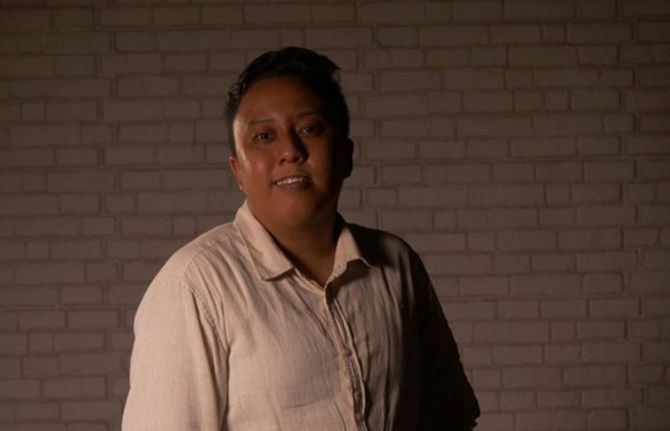

Feature Story
The first but not the last: Indonesian transgender man fights for recognition
29 September 2021
29 September 2021 29 September 2021“This is the name I identify with, and I was determined to have it recognized legally,” said Dimas Cahya (his real name isn’t used in this article), a transgender man from Medan, Indonesia.
Medan, a city of more than 2.4 million people, is a long way from Indonesia’s capital, Jakarta. In Jakarta and Java, Indonesia’s most populated island, many transgender people have successfully changed their legal name to match their gender identity. However, this had never been done in Medan. Similar to the rest of the country, Medan is conservative, with lesbian, gay, bisexual, transgender and intersex (LGBTI) people and issues deemed “immoral”. This was the challenge that Amek Adlian, the paralegal assigned to this case, had to face.
Mr Amek saw Mr Cahya’s strong will and determination and started on research on the process of legally changing one’s name. “I wanted to get all the steps right, from gathering the required documents to preparing for the court hearing. I used my connections to consult with friends who have gone through the process in Jakarta, and got some very useful tips,” he said.
Unfortunately, not everyone who was consulted was supportive or helpful. Mr Amek recalls meeting with a legal aid organization in Medan where Mr Cahya was asked invasive questions, leaving them feeling discouraged and ridiculed. “We reached out for legal advice, but instead we got judgements,” Mr Amek said.
Despite that, Mr Cahya’s determination never faded, and after more consultations with people in Jakarta, Mr Cahya and Mr Amek decided to go through with the court process to apply for the name change, citing “bullying” as the reason for the request. The court process stalled due to incomplete documentation. The court required an official document that shows the preferred name for Mr Cahya. “We were scrambling around looking for something that the court would accept. I asked friends in Java for their guidance, but they had never been asked for such a document before. I feared that this was an effort to complicate our case,” said Mr Amek. Eventually, they submitted a certificate from a public-speaking training that Mr Cahya had just participated in, and, unexpectedly, this certificate was approved.
“Facing the judge was nerve-wracking. The judge stressed that my request to change my full name (as opposed to just the spelling), would “erase my identity”. I had my mother with me as a witness, and she was also very nervous, despite us having briefed her prior. It was a such a relief and a surprise that the judge did not dig out any information about my gender. He stayed out of LGBTI issues completely,” Mr Cahya said.
After a six-week court process, their application was granted by the Medan District Court, and Mr Cahya became the first transgender man in Medan to legally change his name to match his identity.
Mr Cahya is not unfamiliar with being first: he was also the first transgender man to undergo medical transition in Medan, a process which came with its own set of challenges. Despite the many obstacles throughout the whole process, Mr Cahya’s optimism never faltered. “If it had not been approved, I would simply try again in Jakarta,” he said. This is only the beginning of his journey. “Next for me is to change the gender on my identity card,” he said, as his current identity card still uses the gender assigned to him at birth.
The whole process was supported by the Crisis Response Mechanism (CRM) Consortium, which is a consortium made up of the UNAIDS Country Office for Indonesia and four civil society organizations (Community Legal Aid Institute, Sanggar Swara, Arus Pelangi and GWL INA) whose mission is to respond to and mobilize resources for LGBTI emergency crises. Mr Amek himself is a paralegal with the CRM Consortium as well as a community organizer for Cangkang Queer, an LGBTI community organization based in Medan.
Mr Amek credits the CRM Consortium for supporting this work. “Not only did CRM fund the process, but they also capacitate us as paralegals to be able to do such work and learn from each other. For me, learning from other cities was very useful. Now that Medan has done it too, I am happy to share my own lessons with paralegals working with LGBTI communities,” he said.
“Transgender communities are one of the most vulnerable groups in Indonesia. Legal recognition in the form of an identity card, particularly one that matches with the person’s true identity, is a human right that sadly is not enjoyed by everyone equally. This success gives us hope that progress is possible despite the unfavorable environment we are in,” the UNAIDS Country Director for Indonesia, Krittayawan Boonto, said.
Since Mr Amek and Mr Cahya’s experience is the first in Medan, it is no surprise that some transgender men and women have reached out to them to discuss the process of name change, medical transition, etc. Mr Cahya and Mr Amek both agree that the first and most important step is self-acceptance. “The process will be difficult, especially in a country like Indonesia where we are not yet embraced,” Mr Amek said.
Mr Cahya echoed this sentiment, adding, “You should never give up. Set targets for yourself and remember that despite the challenges, you should not assume the worst will happen.” Mr Cahya’s infectious optimism gives light and hope to the lives of gender-diverse people all around the country beyond his hometown of Medan.



